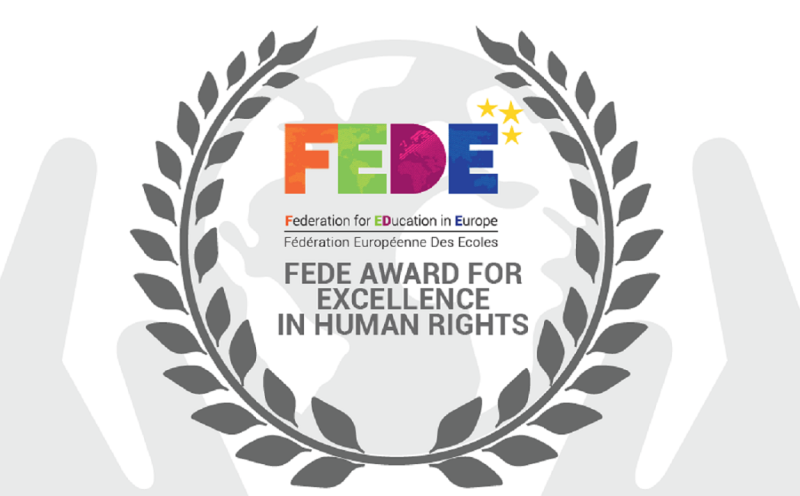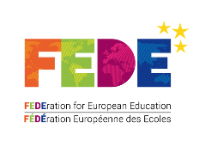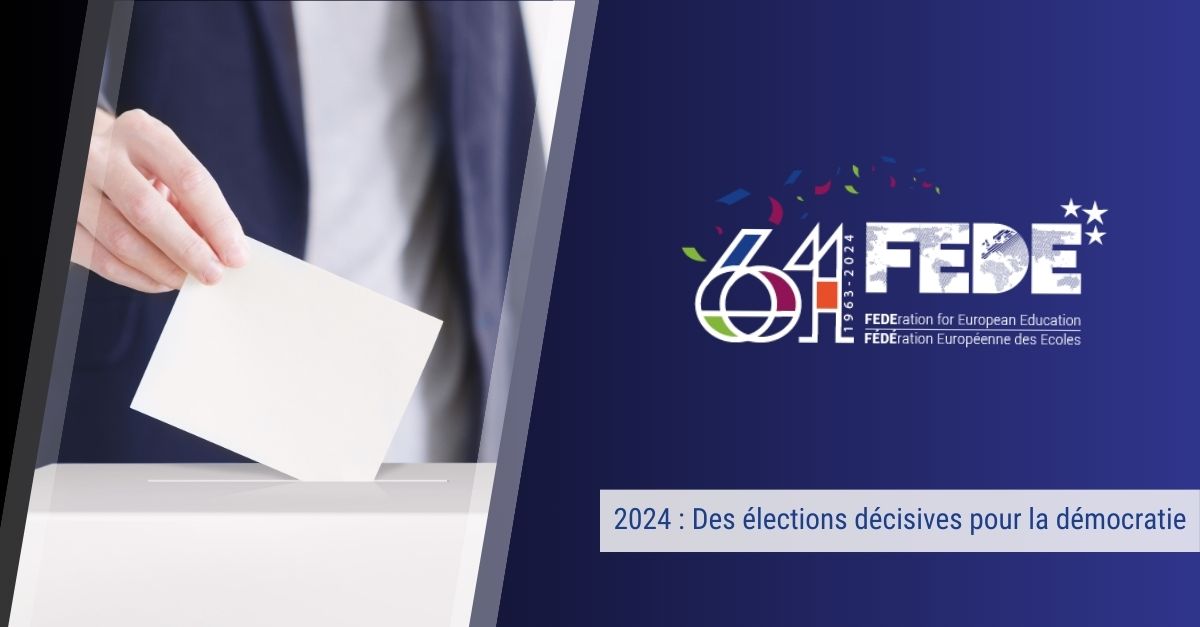HUMAN RIGHTS PRIZE
The FEDE, an international non-governmental organisation (INGO), non-profit organisation, and supranational body holding participatory status at the Council of Europe and consultative status at UNESCO, OIF and ECOSOC has made the promotion of human rights an integral part of its educational work.
Drawing on the Universal Declaration of Human Rights, the FEDE is committed to promoting awareness of, respect for and implementation of human rights among its member institutions by transmitting a message of peace, non-discrimination, equality, justice, non-violence, tolerance, openness and respect for human dignity.
Through its goals and initiatives, the FEDE fosters awareness of major contemporary and future challenges, encouraging the development of an open space for debate and reflection.

Nominations for the 2024 Human Rights Award of Excellence :
Opening of applications: Monday 2nd October 2023
Deadline for applications: 1rst March 2024
Judges meet: during March 2024
The Human Rights Prize will be awarded during the FEDE General Assembly.
Completed entries should be sent no later than the 1st of March 2025 to the following address: office@fede.org
Download the rules here: Rules (PDF)
Download our recommendations to applicants: Recommendations PDF
Download the entry form here: Entry form (PDF) – Entry form (Word)
“We consider the defense and promotion of human rights to be a core part of our commitment. All of our research, all of our teaching materials, all of our actions and all of our training courses are designed around the challenges of citizenship, democracy and human rights. We hope that these values inspire all of our learning paths because we are convinced that they enhance the quality of teaching and contribute to the challenge of better living together. By sharing these values with our international community of close to 200,000 people, we are ensuring that we will train a generation of ambassadors of the ideals of progress; protectors, defenders and promoters of these founding principles”. explains Claude Vivier Le Got – Chairwoman of the FEDE and past President of the “Education and Culture” Committee of the Conference of INGOs of the Council of Europe.
This ideal is implemented through concrete actions…
First, at the Council of Europe, where the FEDE leads the working group “Education, Artificial Intelligence and Human Rights” and plays an active role in the work on Quality Education of the Steering Committee for Education (CDEDU). In both cases, the aim is to make human rights part of education, to promote and guarantee social rights and to advocate for democracy through education. In addition to its institutional work, the FEDE promotes human rights by awarding the annual FEDE Human Rights Prize.
The Prize rewards human rights-centred initiatives led by FEDE students, teachers and institutions. It showcases original projects that help to effectively promote the FEDE’s founding principles.

“Awarding this Prize is a powerful message of promotion of these values within our international network. In front of our changing societies, challenged by poverty, violence or discrimination, the defense and promotion of Human Rights have become an absolute necessity” explains Farhang GHASSEMI, former human rights delegate and former member of the FEDE Committee.
Presentation of the FEDE Human Rights Prize 2024
2024 winners
The 2024 edition of the Prize was a great success, with 65 entries received from 10 member schools in 3 countries (Germany, France, Sao Tomé and Principe). Of the projects submitted in 2024, the Jury awarded 8 prizes in 2 categories:
- The category A for single students or in a two-person team
- The category B for groups over 3 people
1st Prize in Category B: ALFAE (France)
Video raising awareness of differences through disabled sport
1st Prize Category B: CMH Lyon (France)
ICEBERG magazine to raise awareness of prostitution in the hotel industry
2nd prize in category B: FDM Business School (France)
Chéri, on est enceinte” project: a comic strip designed to educate in a fun way about gender and human rights
3rd prize in category B: CMH Lyon (France)
Solidarity Distribution – Social Action” project: Combating food waste and helping the underprivileged
4th prize in category B: CMH Paris (France)
Chemical products in the hotel industry” project – Podcast to raise awareness of the use of chemicals in the hotel industry
5th prize in category B: CMH Paris (France)
Sashimi guide” project – Guide to good practice and hotel certifications
Presentation of the FEDE Human Rights Prize 2023
The ten winners in 2023
The 2023 Human Rights Prize edition was a success with 155 applications coming from 8 members institutions in 4 countries (Germany, Belgium, France, Morocco). 81 FEDE students were involved in the 10 Prize winners in 2023. There are two categories :
- The category A for single students or in a two-person team (1 Prize attributed in 2023)
- The category B for groups over 3 people (9 Prizes attributed in 2023)
Project “No, it’s no !” about women rights
1rst category B Prize: ESTC School of Management (Marseille)
Project about migration and human rights
2nd category B Prize : Merz Schule High School (Germany)
Project about the respect of human rights
3rd category B Prize : School of Design of the Nouvelle-Aquitaine region (Poitiers)
Eilha Project on combating bullying at school
4th category B Prize : Paris School of Management Group (GPEM) – Apollon School (Paris)
Project Jock DSB about inclusion through sport
5th category B Prize : CERDEN (Belgium)
Project “Eat healthy and cheap” about the links between sustainable development and nutrition
6th category B Prize : GPEM – Elton Mayo Institute (Paris)
Project HelpWork about the respect of human rights
7th category B Prize : GPEM – Marketing and Digital Creation School (EMCD) (Paris)
Project BOOKSEND about access to literature
8th category B Prize : GPEM – Marketing and Digital Creation School (EMCD) (Paris)
Project Discrim Free about the struggle against discriminations
9th category B Prize : ISCL of Bourgoin-Jallieu
Project of a European citizen trip related to multiculturalism, EU and respect of human rights
Presentation of the FEDE Human Rights Prize 2022
2022 winners
This project involved students, teachers, medical staff and residents’ families.
Second Prize: ISCL (Bourgoin-Jallieu, France)
The Second Prize was awarded to a new FEDE institution, his students worked on the ‘duty of memory’ and the visit of emblematic sites in Germany. The project focuses on examining history so as to better build the future.
“I was in Berlin 1989, and I was struck by the enthusiasm there for the reunification of West and East Berlin. I have encouraged my students to experience and understand this European enthusiasm through the duty of memory.”
Presentation of the FEDE Human Rights Prize 2021
FEDE Human Rights Prize 2020-2021
Anaëlle Rivière, Léa Poudroux, Amandine Fidji and Myriam Imaho, all students at HEDECI (Tampon, La Réunion), are the winners of the 2020-2021 FEDE Human Rights Prize.
The winners impressed the judges with a bilingual French-English (just like the FEDE!) video report giving centre stage to the peaceful, harmonious life of people living on the island La Reunion, who have a number of different cultures and faiths.
In a combination of shots of the island and interviews with locals, the four young winners expressed their love for the island and brought to life many of the values dear to the FEDE: respect for diversity, tolerance, fraternity, equality, dialogue between people of different views, and the quest for peace and harmonious societies.
The second prize was awarded to Olivier Michel, a student at ENACO (Lille, France), who wrote a short story on the topic of education and the sharing of knowledge. Nasser Said, Nirina Rahmah RabennantoAndro, Terence Grégory Ko and Amate Kangnizou Alfred Octavien (Marrakech, Morocco) won the third prize for a project combining a PowerPoint presentation and interviews on the inadequacy of politically motivated human rights policies in Africa.
The FEDE congratulates all the competition entrants, in particular the nine students who won the first three prizes (€850, €500 and €350). In order to encourage more students and institutions to enter the competition, the FEDE’s Committee has decided to double the prize money on offer for the 2022 competition. The winnings will be distributed among the future winners of the first, second and third prizes. As a reminder, the teachers who have supervised the winning projects win €150. Additionally, each of the winning students receive a personal certificate of excellence.
2024: Decisive elections for democracy
The year 2024 promises to be a period of electoral density unequalled since universal suffrage was first introduced in 1792 by a pioneering country, France, at a time when only men had the right [lire plus]
Focus on the characteristics of Human Rights
Human rights are the inalienable rights of all human beings, regardless of nationality, place of residence, gender, ethnic or national origin, color, religion, language or any other condition. They imply both rights and obligations at both the individual and state levels. They are :
- Universal and inalienable: International human rights law is based on the principle of universality, which implies that the Right is inherent to all human beings. Therefore, human rights are inalienable. They cannot be abrogated, except in special circumstances and in accordance with a specific procedure.
- Interdependent, indivisible and inseparable: All human rights are indivisible, that is, interrelated and interdependent, in the sense that the violation of one right often compromises the exercise of several others and the improvement of one right facilitates the progress of others. They are therefore of equal importance and essential to the dignity and worth of every human being.
- Equal and non-discriminatory: International human rights law gives universal value to the principle of non-discrimination. This principle is accompanied by the principle of equality, which appears in Article 1 of the Universal Declaration of Human Rights: “All human beings are born free and equal in dignity and rights”.


